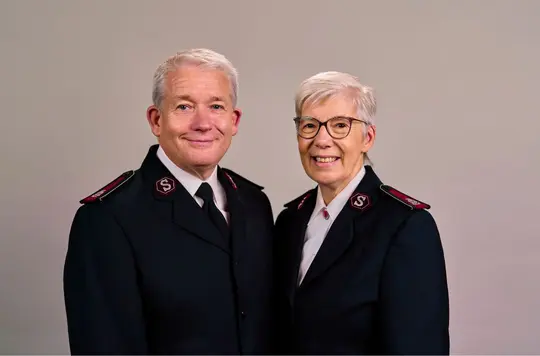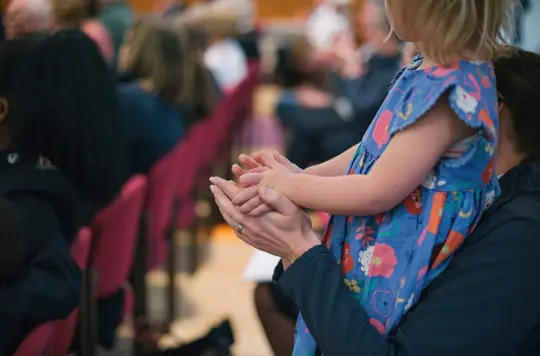1 November 2025
Prophetic voices: We are called to speak truth and hope
Major Kerry and Lieut-Colonel Nick Coke

Major Kerry and Lieut-Colonel Nick Coke (THQ) call us to be a prophetic voice in the public square.
Billie Holiday’s ‘Strange Fruit’, a song about the lynching of black Americans, is widely regarded as the greatest protest song of all time. Why? First, it spoke truth. Second, it was embodied by the messenger’s own experiences. Third, it provoked a reaction. Fourth, it came with consequences.
Speaking truth, embodying the message, provoking a reaction, living with the consequences – these are the hallmarks of the prophetic voice. It is a strange fruit, indeed.
Billie was not the first to sing a powerful, prophetic song. Perhaps that was Mary, who, upon becoming pregnant with Jesus, burst into the Magnificat (see Luke 1:46–55). Considering the time and context, Mary’s song is revolutionary and subversive. It speaks of a world turned upside down, where the humble are lifted up. It speaks truth, it is embodied by the one who sings it, it demands a reaction, and it comes with consequences, not least Mary’s son being crucified.
The Old Testament prophets, too, spoke God’s truth in song and poetry, energising God’s people to a new way of living and being. They included the uneducated Amos, raging against people’s hypocrisy, the compassionate Jeremiah, whose prophecies became deep laments, the courageous Nathan, who told King David his misdeeds had brought judgement on the kingdom, the apocalyptic Ezekiel, whose imagination cast visions we still marvel at, and Jonah, who tried to run from his calling.
The prophetic voice has many tones – anger, lament, courage, imagination, discomfort, disruption and hope. And it comes from different kinds of people – men, women, young, old, the learned, the uneducated, the marginalised and the underestimated.
In the New Testament, the prophetic voice takes on a different shape with the coming of the Holy Spirit. Prophecy becomes available to the many – a gift given to the Church.
In the Gospels, we witness Jesus as a prophet. He displays anger (see Matthew 21:12 and 13), he despairs at the state of God’s people (see Luke 21:28) and speaks of the last days to come (see Mark 13). Many at the time believed the Messiah was going to liberate them and Jesus did: his revolution was through spiritual empowerment, which had social and ethical implications.
Jesus’ Sermon on the Mount lays out the way Christians are called to act. Love your enemies. Give to people in need. Don’t judge others before yourself. Forgive others. Reject violence. These are all prophetic acts of standing your ground against oppressive powers.
So what does all this mean for us today?
We live in a world where ideas of truth have become complex and contested. Political and public culture is driven by emotional narratives, argument and division, often to the detriment of factual accuracy. The prophetic voice is about recognising God’s greater vision of a life where people are drawn together, not set apart.
Where should we use our prophetic voice to speak truth? Today’s public square is everywhere – our homes, streets, schools, town halls, corps, workplaces and digital spaces. Authentic faith transforms everything about us – our words, our actions, our attitudes – and cannot be hidden. We must therefore embody our message in our hearts and in the values we live out every day. A prophetic message is more than words.
Whenever we live and speak prophetically, we will provoke a reaction. This is perhaps the most challenging element for us as an organisation. How prophetic can we be while protecting goodwill towards us? We also have our own internal public square that needs to hear the prophetic voice. We cannot expect to point the finger at others without examining ourselves.
The Old Testament prophets often end their messages with a vision of hope: a world made new, bathed in God’s light and love, with Jesus at the centre. This world is coming. Let us imagine and articulate this real hope.
We can do this by keeping calm, remaining compassionate, staying humble and being faithful, by pointing to God’s expansive love, going deep into life with Jesus and being relentlessly hopeful. It requires all of us being dedicated to Jesus and one another. Being a Movement that goes to the hard places and seeks to live the Jesus way. Being a people willing to love the one who disagrees.
This is our prophetic voice in the world.
Discover more

A territorial framework with focus areas and key questions to guide decision-making.

Blueprint for Better Choices: A message from the Territorial Leaders

Secretary for Spiritual Life Development Major Gordon Cotterill talks about courageous discipleship and his new role.
